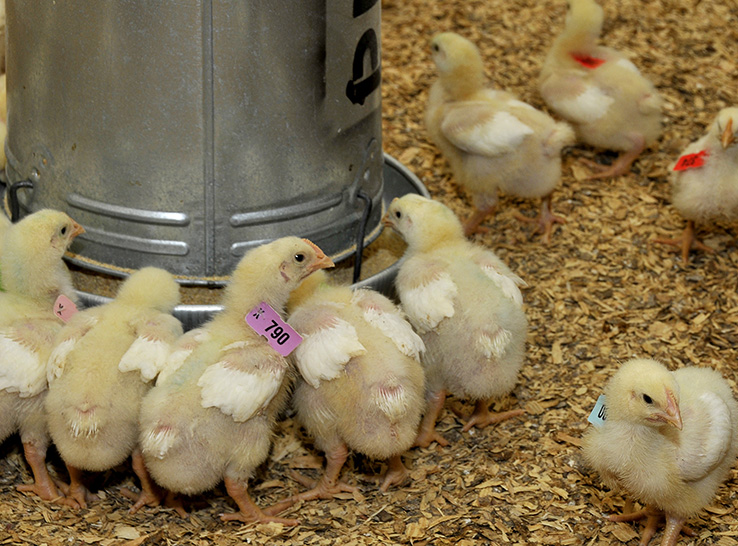Two direct-fed microbials (DFMs) have shown promise in reducing health problems associated with Enterococcus cecorum in broilers.
The bacterium is commonly seen in nonpathogenic form in broiler intestines, but pathogenic forms can escape the gut and cause septicemia and osteomyelitis.
A research team led by Matthew Jones, DVM, PhD, at Southern Poultry Research Group, conducted a 42-day experiment to test whether two DFMs could play a role in reducing this issue, which has recently had a reported uptick in prevalence.
Jones reported their results at the 2024 International Poultry Science Forum.
Three groups tested
They fed the two supplements to eight groups of 25 male Ross broiler chicks per treatment at the same rates: 3.0 x 105 colony-forming units (CFU)/g (0.20%) from the start of the experiment to day 35, then 7.5 x 104 CFU/g (0.05%) from day 35 to 42. The groups receiving the supplements were named “DFM-1” and “DFM-2.”
The researchers also applied a probiotic gel to the chicks at hatch and vaccinated them against coccidiosis. A third group — the control group — was not fed any supplement.
For the infection challenge, they orally gavaged birds from all the treatment groups with a known pathogenic strain of E. cecorum at the start of the study.
On day 21, the researchers necropsied four birds from each pen and then sampled 100 birds from each treatment at the end of the experiment. For their analysis, they evaluated the prevalence of E. cecorum in birds’ spleens at days 21 and 42, and in their free thoracic vertebrae at day 42.
They also recorded bird weights at the start of the study and on days 21, 35 and 42.
Microbials and probiotic reduce infection
The researchers observed no significant difference in E. cecorum prevalence in the birds’ spleens at day 21 (control was 22%). However, there were significant differences in the pathogen’s prevalence in the spleens by day 42, with 67% prevalence in the control group, 46% in DFM-1 and 33% in DFM-2.
Similarly, analysis of free thoracic vertebrae sampled at day 42 revealed a 40% prevalence of E. cecorum in the control group but only 23% in DFM-1 and 19% and DFM-2. However, the researchers saw no differences in bodyweight gain or feed conversion between the groups by the end of the study.
“Based on the outcomes of this study, the combined probiotic gel and DFM products had an observable impact on E. cecorum tissue colonization in the spleen and free thoracic vertebra on day 42,” Jones said.
Jones’s team concluded that the combination of products reduced the amount of pathogenic E. cecorum escaping the gut and that the use of the supplements may result in the need to cull fewer birds in the days leading up to processing.
They did, however, note that given the DFMs and probiotic were combined in the study, future studies may evaluate these products alone or in combination to understand the efficacy of each component.





